
CAT Conversations – Ruth Chapman of renewable energy pioneers Dulas Ltd
April 13, 2022Home » CAT Conversations – Ruth Chapman of renewable energy pioneers Dulas Ltd
Ruth Chapman is the Executive Managing Director of Dulas Ltd, a pioneer in the use and development of renewable energies and technology. We spoke to her to find out more about Dulas and how CAT helped start it all.
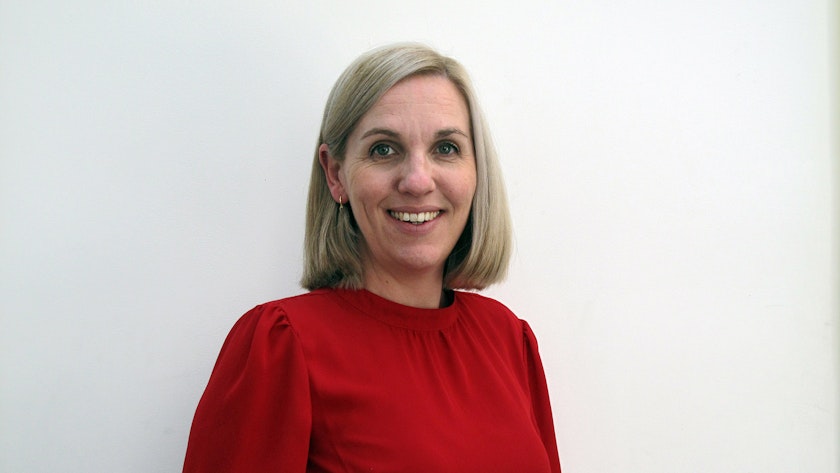
CAT: Tell us a little about how Dulas came about and the connection with CAT.
Ruth Chapman: Back in the early 1980s, a group of engineers based at CAT began to develop a variety of renewable energy products aimed at solving various issues, both in the UK and internationally. These products were early versions of our dataloggers, used to capture wind data for the onshore and offshore wind energy markets, and our solar powered vaccine refrigerators, designed to ensure blood and vaccines are kept at the precise temperature required to remain viable. In 1982, these engineers formed Dulas, and we have been pioneering products and services within the UK renewable energy and international humanitarian aid markets ever since.
CAT: How has CAT influenced your work since then?
RC: Dulas Ltd currently employs around 50 people, with an additional 25 employed at its factory, Polestar Cooling Ltd. The majority of the Dulas employees are based in Mid Wales, at our headquarters, which is next door to CAT. Many of our employees have either studied or worked at CAT. In fact, I completed an MSc at CAT in 2011, and I have worked at Dulas ever since. As a co-operative organisation, many of our principles are aligned with CAT’s ethos, and we share CAT’s passion for providing solutions to climate change, both at home and globally.
CAT: It’s the 40th anniversary of the creation of Dulas this year – what achievements are you most proud of?
RC: Too many to mention! First of all, we are proud of our people and their commitment to our vision – to bring reliable and costeffective zero carbon energy solutions
within reach of every organisation, every community and every individual. Our employees are highly skilled engineers, consultants and project managers who work to ensure renewable projects are well designed, consented, implemented effectively, optimised and looked after. As an employee-owned co-operative we have significant buy-in to our vision and values from our members, and they help shape the strategic direction of the company. This makes it a rewarding place to work.
Secondly, we are very proud of the difference we have made to the UK renewable energy market. Our expert planners and Environmental Impact Assessment (EIA) specialists are directly responsible for ensuring consent for a wide variety of renewable energy projects across the UK and Ireland, in particular some 550MW of dedicated wind energy projects, along with more than 420MW of solar PV. Our teams of engineers maintain and help optimise many renewable energy systems, directly contributing to a reduction in fossil fuel use in the UK.
Thirdly, we take significant pride in the difference our solar direct drive (SDD) powered vaccine fridges make internationally. We design and manufacture within the UK and export and install thousands of SDD fridges annually. Our products are suitable for both routine vaccination programmes and humanitarian aid requirements. They can be used in remote areas with little or no grid connection, so they really do make a difference to the lives of people living in those areas.
Finally, we are proud of our longevity in the marketplace as a respected organisation delivering high value, appropriate, effective solutions and technical excellence.
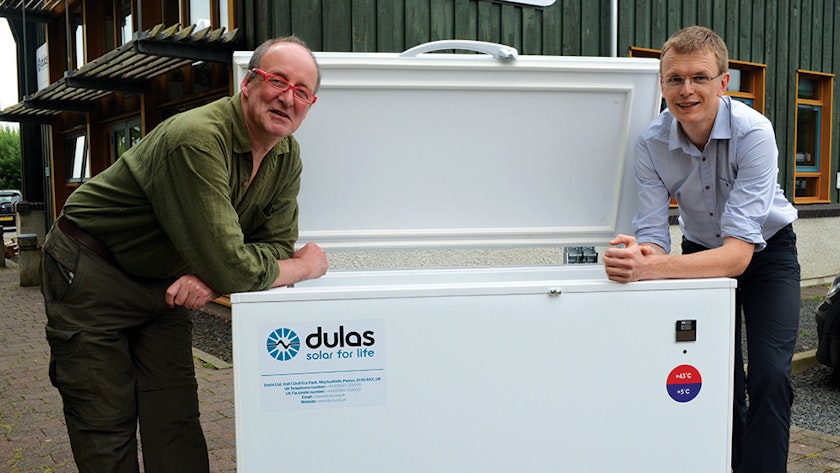
CAT: As one of the pioneers of renewable energy, what are the main changes you have seen in the sector over the past four decades?
RC: The industry is constantly evolving, with new and more effective technology. There is also greater political pressure, both within the UK and globally, to reduce our reliance on fossil fuels and address the impacts of climate change. For example, public attitudes have changed significantly regarding both the visual impact of, and the need for, the infrastructure for installed renewable energy projects. Government policies and support mechanisms have also changed significantly over the last decade.
In terms of technical changes, we have seen the physical growth of turbines, where economies of scale have driven wind energy to achieve huge progress towards lowering the cost of energy production, particularly offshore. The emergence of lithium-ion battery systems and the huge emphasis on energy storage is another feature of the evolving energy market, whereas previously energy storage was thought of as something that was limited to off-grid renewable power instead of being mainstream. Finally, it is impossible to comment on the changes in the sector without mentioning the revolutionary changes associated with the industrialisation of solar PV. More than any other technology, this has been the genuine game-changer for the renewables industry and represents a cornerstone of any worldwide decarbonisation strategy.
CAT: How has the pandemic and subsequent lockdowns, followed by COP26 in November, affected people’s views on renewable technology?
RC: I’m not sure if the pandemic has affected people’s views, but certainly the current context of rising energy costs and the focus being given to climate change by the UK government and internationally has. The public attitude towards renewable energy projects has been shifting positively for a long time, as reflected in the UK Government’s Public Attitudes Tracker, and we have seen a much more positive response to large onshore wind projects through the consultation process. I imagine this growing support will continue as the cost of energy rises and the supply of energy from fossil fuels continues to be unpredictable. Unfortunately, the financial effects of the post-pandemic recovery process may have a knock-on effect on the level of funding put towards incentivising more renewable energy.
Following the growing pressure from the public for the government to act to tackle climate change, there have been positive developments in policy. For example, in December 2021 the Welsh Government published recommendations on how to significantly scale up renewable energy in Wales. The UK Government published its ‘ten point plan for a green industrial revolution’ in November 2020 and then hosted COP26. However, the world has been very focused on the response to the pandemic, and there needs to be a renewed focus on installed renewable energy capacity to meet the ambitions of pledges made at COP26.
CAT: What is needed for businesses like Dulas to help the UK address the climate crisis?
RC: We need the UK and devolved governments to ensure that the right policy mechanisms are in place to support developers to implement projects that increase renewable energy capacity and address barriers to development, such as grid constraints for the onshore wind market in Wales.
As one of the pioneers of the renewables industry, Dulas has a proven track record of delivering renewable energy schemes that adhere to the principles of responsible development. Companies like ours have a huge amount of knowledge and capability to assist the transition away from fossil fuels, but the role of government cannot be overstated. The changes that are coming will need both the consistent application of policy, and recognition of those who are vulnerable to the costs of change.
CAT: What’s next for the UK renewables market?
RC: In the medium-to-long term, we expect green hydrogen or derived synthetic fuels to receive more attention as possible energy carriers moving forwards. This is because it is difficult to imagine that batteries alone could address the challenges of seasonal energy storage requirements of a true net zero system.
Dulas is currently researching the feasibility of hydrogen production from renewable energy sources in Wales. Offshore wind is likely to continue its strong growth in the short term, but we would like to see more development in the large-scale onshore wind market, particularly within England where overall planning policy has been unfavourable for several years. Despite these barriers, we know that developers are pursuing potential sites for planning applications, and so we consider that to be a positive sign. We would also support new investment and policy for additional hydropower within the UK because at present there are few incentives for such schemes to be built.
Alongside large-scale industrial development, we ought to mention that there are dozens, if not hundreds, of successful community-owned energy schemes that are both planned and in operation today. With the modularity and flexibility of the new technologies and information (and funding) available to help communities develop their own
schemes, it has never been easier for small, independent organisations to access renewable energy. In particular, Dulas has worked with several community groups using the Rural Community Energy Fund to establish a variety of solar, wind or hybrid projects in the last five years.
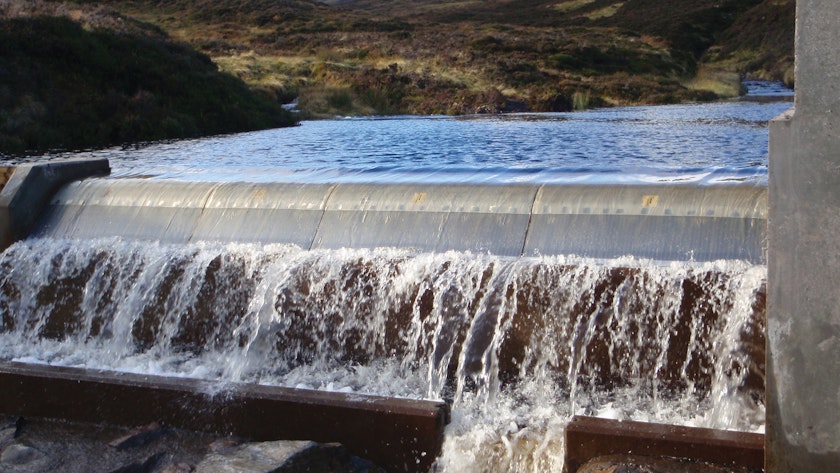
CAT: What can you tell us about your key projects for 2022?
RC: We have several large-scale Environment Impact Assessments for onshore wind and solar that we are managing on behalf of clients, as well as working with hydro asset owners on projects to optimise the energy they get from their turbines. In addition, we are undertaking many complex wind monitoring projects using meteorological masts and remote sensing equipment for early-stage wind projects. We are also working with high energy users (such as factories and public bodies with high energy demands) to offset their energy use through integrated renewables (including battery storage).
In terms of new products and services, we are currently testing our prototype electric vehicle charger for the off grid/weak grid market at our headquarters. The charger combines solar energy and battery storage to provide charging capacity for areas with grid constraints.
We are also researching the feasibility of hydrogen production in Wales using renewable energy sources. This research has been funded by the Welsh Government HyBRID programme.

You’re also a CAT graduate – can you tell us a bit about your studies and the impact they’ve had?
RC: I have always had an interest in environmental issues, ever since being introduced to the concept of sustainability at secondary school. I gained a BA degree in Environmental Management but then drifted away from the subject in my employment. I met some ex-CAT students who raved about the eco centre and the courses and as a result I ended up undertaking a Masters in Advanced Environmental and Energy Studies. The course was very stimulating and the whole experience was a lot of fun! For my thesis, I examined public opposition to onshore wind farm development in the Mid Wales area, gaining a lot of knowledge around the challenges facing the development of onshore wind sites. As I neared the completion of my studies, I saw a job advertised with Dulas Ltd working with the Wind Monitoring team. That was over
10 years ago, and I have since worked across the company in various roles.
For the last three years, I have been the Managing Director which is hugely rewarding. CAT is responsible for giving me the knowledge and passion to find a very fulfilling role within the renewables industry!
Find out more
For more information on Dulas visit their website
You can read more about a range of renewable energy technologies on our Information Service webpages
- Graduate School
- Energy
Related Topics
Related news

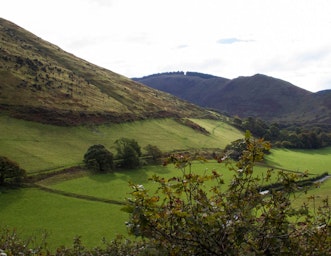
CAT Conversations: Sandy Stevens, CAT graduate
17th April 2025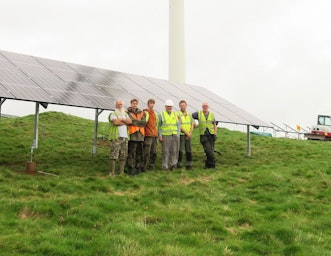
More solar energy for CAT
4th April 2025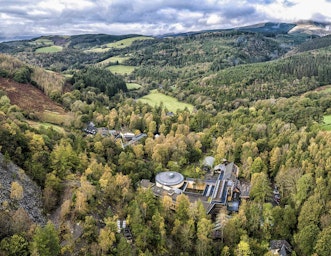
CAT Student Bursaries Announced for 2025
30th January 2025EMAIL SIGN UP
Keep up to date with all the latest activities, events and online resources by signing up to our emails and following us on social media. And if you'd like to get involved and support our work, we'd love to welcome you as a CAT member.
